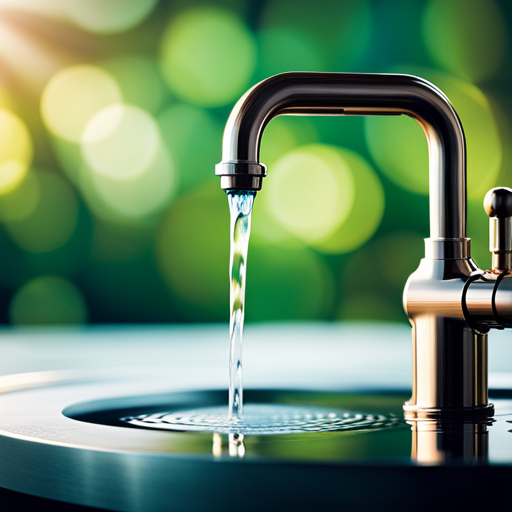Are you noticing brown water coming out of your well? Don’t panic, it’s a common problem faced by many homeowners. The brown color of the water can be caused by several factors, such as the presence of iron and manganese, rust, or even a broken-down water softener. Regardless of the cause, it’s essential to identify the underlying problem to take the necessary steps to fix the issue.
In this article, we’ll provide you with the information you need to know about brown well water. We’ll explore the common causes of brown water and guide you through the treatment methods and preventive measures you can take to ensure that your well water remains clean and safe for use.
So, let’s get started and find out what you need to do to address the problem of brown well water!
Key Takeaways
– Brown well water can be caused by various factors such as iron and manganese, rust, iron bacteria, surface water seepage, poor well structure, tannins, broken-down water softener resin beads, silt or sediment.
– Treatment methods for brown well water include sediment filtration, air injection oxidization, reverse osmosis, greensand filtration, water softening, well repairs, and pipe replacement.
– Preventive measures include regular maintenance of well and plumbing system, monitoring water quality, and implementing sediment filters or tailored water treatment systems.
– Professional water testing is essential for determining the specific cause of brown water and selecting the appropriate treatment method. High levels of iron and manganese can cause stains and an unpleasant metallic taste, while corroding pipes and well components can introduce rust into your well water.
Causes of Brown Water
If your well water is suddenly brown, it could be caused by a variety of factors. One common cause is high levels of iron and manganese in the water. These minerals are naturally occurring and can enter your well water through rock formations or soil. When present in high concentrations, they can cause brown or black stains on fixtures and an unpleasant metallic taste in your water.
Rust can also be a culprit of brown well water. Corroding pipes and well components can introduce rust into your water supply, causing it to turn brown. If you suspect this is the cause of your brown water, it’s important to have your well and plumbing system inspected by a professional to identify and address any issues.
High levels of iron and rust in your well water can not only cause aesthetic problems, but can also impact the quality and safety of your water.
Treatment Methods
Consider sediment filtration, air injection oxidization, reverse osmosis, greensand filtration, water softening, well repairs, or pipe replacement to treat the brown well water issue.
Each treatment method has its own advantages and disadvantages, but some may be more effective than others depending on the specific cause of the brown water. For example, air injection oxidization is effective in removing iron, manganese, and sulfur from well water, but it may not be as effective in removing other contaminants.
On the other hand, reverse osmosis can remove a wide range of contaminants, but it may not be suitable for large volumes of water. If you’re considering treatment methods for your brown well water, it’s important to compare the effectiveness of air injection oxidization and reverse osmosis.
Air injection oxidization can be effective for removing specific contaminants, but it may not be as comprehensive as reverse osmosis. Reverse osmosis can remove a wider range of contaminants, but it may not be as effective for larger volumes of water.
Ultimately, the best treatment method for your brown well water will depend on the specific cause of the issue and your water quality needs. Consult with a professional to determine the most effective solution for your situation.
Preventive Measures
To prevent brown well water from occurring, make sure to regularly maintain your well and plumbing system. This means scheduling routine inspections and cleanings to ensure that your well components and pipes are in good condition. Regular maintenance can help catch any issues early on, such as cracks or leaks, that can allow contaminants to enter your water supply.
Additionally, it’s important to monitor the quality of your water by having it tested by a professional lab. This can help identify any potential problems before they become severe and can also assist in selecting the appropriate treatment method.
Another way to prevent brown well water is to install sediment filters or tailored water treatment systems. Sediment filters can help remove silt, sand, and other particles from your well water, while tailored treatment systems can address specific issues such as high levels of iron or manganese. It’s important to select the appropriate treatment system based on the specific contaminants in your water. Consulting with a professional can help determine the best solution for your individual needs.
By taking these preventive measures, you can help ensure that your well water remains clear and safe for consumption.
Conclusion
So, you’ve learned about the common causes of brown well water and the different treatment methods to address the issue.
But what can you do to prevent it from happening again?
First and foremost, it’s essential to have your well water tested regularly to detect any changes in color or quality.
Additionally, consider installing a water filtration system or water softener to remove any impurities that may cause discoloration.
It’s also essential to maintain your well and the equipment used to treat your water regularly.
By taking these preventive measures, you can ensure that your well water remains clean, clear, and safe to use for years to come.
